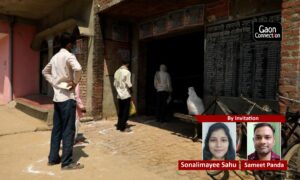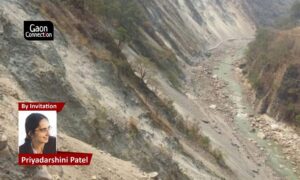On the morning of July 20, the residents of Bada Kalimati and Basantpur villages in Joda Block of Keonjhar district, Odisha blocked the KIDCO road connecting the mining area of Joda to NH 20. This was an attempt by the residents to halt the transportation of iron ore to and from the mineral-rich Joda block in huge trucks and tippers. In a similar occurrence, in April, during the COVID-19 lockdown, the residents of Kamarjoda and Jurudi in Keonjhar gathered in protest and demanded that the mining and transportation operations near their homes be shut down.
In April, Keonjhar had no cases of coronavirus infection. There are almost 400 cases in the district now and the numbers are rising by the day. The Government of Odisha order dated June 30, 2020, which lays down the state guidelines for COVID-19 management has put the district of Keonjhar in Zone-1 till July 31, 2020. There is a complete lockdown in the districts during the weekends and a strict curfew in place. However, even in such a situation, the villagers have been forced to come out on the streets.
Are community protests becoming usual in these unusual times?
Since the beginning of the nationwide lockdown in view of the pandemic, the people of Joda, Bada Kalimati and Bamberi have claimed that the frequency of transportation of minerals has increased. The condition of the KIDCO road from Palaspanga to Bamberi which has been bad even before the lockdown has turned deplorable now. The transportation goes on for 24 hours a day – even during the curfew hours and the strict weekend lockdowns. While the communities have been suffering the economic and social impacts of the COVID 19 lockdown, it has made no difference to the miners and the mineral transporters whatsoever.
“Lockdown and shutdowns are only applicable to local people. The mines/industries and transportation of minerals are not in the purview of lockdown,” said Balabhadra Patra, a resident of Bada Kalimati. “Every day, trucks/tippers come from Gopalpur, Ganjam District of Odisha which is a COVID-19 hotspot area and hence there is a high risk of local transmission of Corona. Haulpack mining trucks are now being used for transportation of minerals here. Other heavy vehicles from states like Nagaland, Rajasthan, and Chhattisgarh have also come to the area for transportation,” Balabhadra told Gaon Connection.
These vehicles transporting iron ore fines and pellets do not follow the environmental safeguards prescribed by the clearance documents issued to the industries and mines. Since lockdown, the water sprinkling to check dust pollution along the transportation routes has been discontinued and the trucks are not being covered with tarpaulin.
“Dust pollution on road is also increasing due to the lack of monitoring of mining activities by regulatory authorities. Our food, clothes, utensils, and homes are covered with dust and mud,” said Rabindra Khamania of Bada Kalimati village. “Our Nallahs and water sources which we use for domestic purposes are full of dust. This is the season for the sowing of seeds on our agricultural lands but due to heavy dust, germination of seeds has also decreased,” he complained.
There are traffic jams throughout the stretch of road for hours. This has limited the communities’ access to basic healthcare services as the ambulances get stuck in long traffic jams, even as the COVID-19 health emergency has made the importance of a strong public healthcare system very clear to the rest of the world. People residing along these transportation routes have very unwillingly accepted road accidents to be a part of their life now. More often than not heavy trucks have also killed their domesticated animals leading to a loss of livelihood.
The nationwide lockdown in April had left the affected people with no grievance-redressal mechanism as government offices like the Pollution Control Board (PCB) was functioning remotely and the district administration was engaged with the pandemic control.
This had forced people to come out of their homes and protest, and make their voices heard. However, the journey from Lockdown 1 to Unlock 1 has not changed much for the people of Joda. Their complaint letters and repeated phone calls to the PCB have not yielded any response till now. Even in their repeated visits to the regional office of the PCB, they have never found the regional officer in there.
“Regional officer of PCB is silent on dust pollution caused by transportation. He has not come to visit the area since past 6 months. What can we do? Due to lockdown our voices are being crushed,” said Daimani Munda of Dubuna village. “Either we can protest or just keep waiting for our issues to be resolved by authorities,” Munda added.
From April to July, the grievances of people have continued. Now, they have been forced to venture out of their homes once again amid rising COVID-19 cases. The residents of Bada Kalimati and Basantpur along with other villages along the transportation routed to and from Joda have been demanding a shutdown of this mineral transportation for a long time now.
They have lost faith in the compliance of environmental conditions and safeguards to provide them with an incentive to coexist with mines and allied activities beside their homes.


















